Ever felt a tug at your soul or questioned your beliefs? Let’s explore the lesser-known signs of religious trauma and how to reclaim your peace from its impact.
If there’s any topic that has impacted my life so deeply – and yet I’ve been putting off writing for over ten years – it’s religious trauma.
The topic of religious trauma is such an inflammatory topic, and one that has harmed so many people, that I’m going to try and approach it as delicately as I can.
Religious trauma is pervasive and more widespread than I believe most people are aware of. After all, the foundation of most modern societies are based on religious ideals, whether you live in the east or west.
So to get this out of the way before I begin:
Do I think all religion is evil? Am I an anti-theist? No. Religion serves a valuable function in society by emphasizing social connectedness, support, values, and higher ideals. For many people, religion is what makes life worth living, and it has helped them in their darkest times.
Do I believe all religious people are horrible? No. In fact, many religious people are some of the kindest and most generous souls you’ll ever meet.
Do I “hate” Christianity? (The religion I was brought up in.) No, I don’t hate Christianity. I can see the value in this belief system, and I respect and admire figures such as Jesus, Mary Magdalene, and the Virgin Mary (who I still feel an affinity with).
But here’s the thing:
Religion, with all of its underlying value, can easily become something destructive, abusive, perverted, and traumatizing.
In this article, I’m going to explore the dark side of religion as a religious trauma survivor, and also how to heal these wounds from a deeper perspective.
Please note: In the interests of keeping this a safe space, and to respect my own personal boundaries, any comments deemed abusive, harmful, or proselytizing will be removed. Thank you for respecting the healing journeys of others.
Also, this article is written from an ex-Christian perspective, but it applies to anyone from any religion. If your unique experiences of religious trauma aren’t mentioned here, I apologize – they are just as valid. I can only write from what I have personally experienced.
Trigger warning: This article contains mention of sexual abuse, murder-suicide, self-harm, suicidal ideation, physical abuse, and other triggering topics. Proceed with caution.
In the interests of being trauma-sensitive, if at any point you feel overwhelmed by reading this article, please stop, take a break, and return to this page later (you can always bookmark it). And be sure to share this article with anyone who you feel might benefit.
Related: Religious Narcissistic Abuse: 15 Tactics Narcissists Use To Control You
What is Religious Trauma Syndrome?
Religious trauma refers to the deeply felt ongoing mental and emotional suffering one experiences at the hands of a religious belief system.
Experiencing religious trauma can happen to anyone of any faith at any point in their lives – and it can be cumulative or sudden.
In other words, religious trauma can slowly build through a person’s faith journey or it can occur as a sudden shock such as through a public display of humiliation, sexual abuse, or another unexpected painful incident.
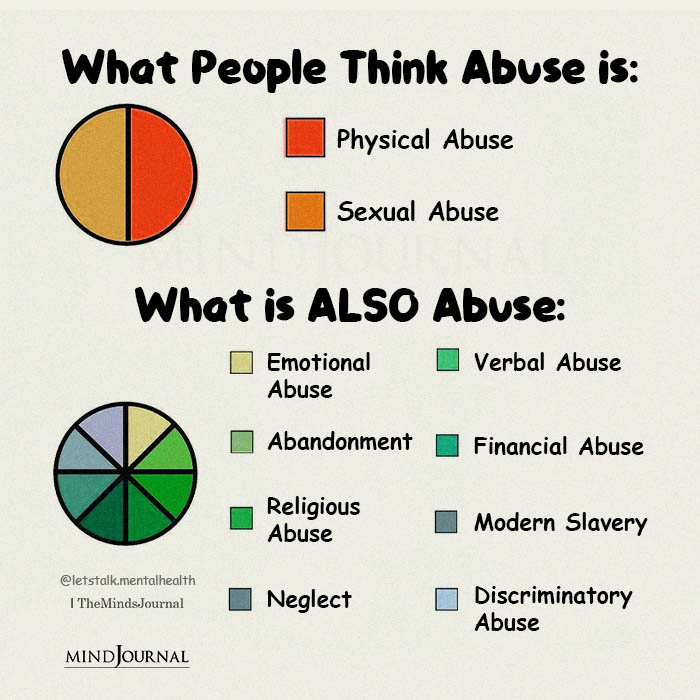
My Experience With Religious Trauma Syndrome
Religious trauma for me was a cumulative experience that reached its peak at the age of 19 when I decided to finally cut ties with the fundamentalist religion of my childhood (and unfortunately my blood family alongside it).
Since birth, I was raised in a fundamentalist Christian church known as the Church of Christ who prided themselves on a strict adherence to biblical tenets.
I was taught that the CoC was the “one true church,” that those who belonged to it were “special and chosen,” and that all other beliefs (including other Christian denominations) and belief systems were false – and that those believing in them would end up burning in hell for all eternity.
I was indoctrinated with purity culture ideals of staying a virgin until marriage – that a woman wasn’t allowed to speak in church, couldn’t be a leader or “elder,” or do anything other than be a good homemaker and “submit” to her husband.
I wasn’t permitted to cut my hair, celebrate Christmas or Easter (or any other “non-biblical” holidays), or be overly “worldly” because I was taught to believe that “Satan prowls around like a roaring lion looking for someone to devour.”
Imagine being taught, as a tiny little girl, that not only is the Devil always out to try and get you, but that if you’re “bad” in any way, you’ll suffer for all eternity in hellfire in the worst possible agony you could ever imagine? That’s a pretty fucked up thing to teach a young child.
Being indoctrinated at a very young age, for almost two decades with paranoid, bigoted, and fear-based beliefs about the world, it was no wonder that my mental health took a nosedive in my later adolescence.
When I began to question why an “all-loving God” would send people to burn in hell forever if they didn’t “follow what He wanted,” my world began to crack apart. Just like in The Truman Show, my whole understanding of reality began to collapse and crumble beneath me.
Reading the Bible three times over didn’t solve any of my problems either – it made the situation worse.
I remember sitting in church during a sermon one Sunday, feeling the deeply disturbing sensation that my soul was slowly dying.
Sudden thoughts of murder-suicide would flash through my fragmented mind as disturbing bloody images of stabbing the preacher over and over again – and then killing myself – would burst into my awareness. (I later learned that these thoughts signalled the emergence of my heavily repressed and rejected Shadow Self.)
This drive toward self-harm and suicidal-ideation began as a teenager and continued until a little after I left the religion, but thankfully it never resulted in anything serious.
There’s a lot more that I could share about enduring physical abuse (aka., “biblical” punishment) with a horse whip, spiritual gaslighting, emotional manipulation, social isolation, learning that my favorite Christian friend was a child molester, and the other nuances of an immature and destructive belief system – but I’ll try to keep this simple.
I don’t blame my parents because I know that they were trying to do the best they could with the level of awareness they had. They’re good people deep down with admirable qualities.
I’m sure religion felt like a soothing balm for them and they wanted to instil some kind of values into their children. My childhood wasn’t all bad and there were certainly good parts, and wonderful qualities my parents instilled into me (like creativity and a good work ethic). But religion for me was a horror show that I’m still overcoming to this very day.
Unfortunately, the result of freeing myself from this religious trauma, also meant that I had to become a black sheep and cut ties with my blood family, who were conditioned by their beliefs to see me as a “heathen,” “traitor to the faith,” “sinner,” and so on.
I didn’t leave in a perfect way. I wish I had said goodbye to my siblings early on that morning I grabbed my bags and left. I wish I could have been there to support my little sister and meet my third sister who was born a few years after I left.
But returning to that environment would mean deep self-betrayal, threatening my mental, emotional, and spiritual sanity. Exposing myself to the very situation that caused such deep trauma in me to begin with is not something I’m willing to do again.
My story is certainly not the worst out there – there are so many others who have experienced far worse than I have. And while I am a victim, I refuse to stay as one. I’m a survivor and now a thriver.
And this deep pain is perhaps the main reason why I’m drawn to the symbol of the wolf, writing for and running this website, and exploring the shadows that obscure our Inner Light.
Religion vs. Spirituality
I just want to quickly clarify that this article is focused on religious trauma, not spiritual trauma. Religion and spirituality are two different paths. Here’s the difference, which I define in my article entitled Spirituality vs Religion:
Spirituality is connecting to the Divine through your own personal experience. It is primarily concerned with finding, experiencing, and embodying one’s true spiritual nature.
Religion is connecting to the Divine through someone else’s experience. It is primarily concerned with believing in, following, and obeying the rules created by a certain Deity or spiritual teacher.
If you think you fit into the spiritual definition more than the religious one, and you’re wanting to look more into spiritual abuse specifically, I recommend checking out the following articles.
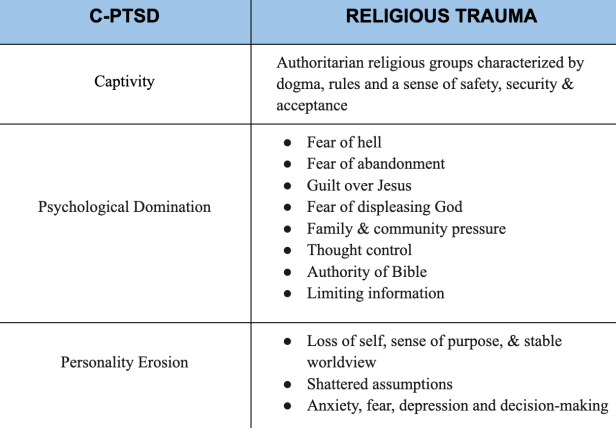
Related: The Problem With Faith: 11 Ways Religion Is Destroying Humanity
23 Signs Of Religious Trauma
How do you know whether you’re experiencing religious trauma? Most likely, you’ll need to self-diagnose as this term isn’t listed in the DSM-5 (which is not saying that listing it as a mental disorder is actually always that helpful).
Trust in your own experience. These signs aren’t meant to “diagnose” you in any way (as I’m not a psychologist or mental health professional). But if you can relate to some of them, chances are that you do indeed suffer from religious trauma:
- Chronic feelings of unworthiness and inadequacy
- Persistent anxiety or panic
- Existential depression or melancholy
- Self-hatred or self-loathing
- Perfectionism
- Obsessive compulsive tendencies
- Weak sense of self
- Poor personal boundaries
- Nightmares or sleep disturbance
- Diminished social connections and loss of community
- Difficulty maintaining friendships, relationships, etc.
- Sexual dysfunction (excessive or under active sex drive)
- Persistent loneliness and feelings of abandonment
- Strong addictive tendencies
- Fear of experiencing joy or pleasure
- Difficulty with self-expression and speaking up
- Intrusive thoughts
- Rigid black-or-white thinking and troubles accepting alternative viewpoints
- Hypervigilance and feeling like one is being constantly watched and judged
- Inability to trust oneself and one’s gut instincts
- Difficulty trusting in other people and the Divine
- Struggles with being self-autonomous and making decisions
- Deep-seated feelings of shame and guilt about normal thoughts, feelings, and behaviors
This isn’t an exhaustive list of religious trauma signs, and if any others come up for you that aren’t listed, trust that they’re just as relevant as what I’ve shared above.
Abuse From Religious Trauma Examples
What about specific examples of religious abuse?
As I said at the start of this article, religious abuse can be both cumulative (aka., happen over a long period of time and in subtle/overt ways) or be sudden (due to a specific incident).
The examples of religious abuse below don’t cover all of the nuances of this complex beast, but I hope they give you a clearer idea of how religious abuse can appear:
- A woman is shamed for dressing a certain way and told that she’s sinning against God for displaying her body.
- A man is judged and ostracized by his religious community for his attraction toward other men.
- A family cuts off their child when the child leaves the religion.
- A person seeks help from their religious elders about marital abuse, only to be told that it’s their lack of faith that is the problem, not the other party’s sexual/physical/emotional abuse.
- A child is physically, mentally, or emotionally punished for doing or saying something that is perceived to be against the parent’s beliefs.
- A religious community pressures and coerces an older person to donate more money than they can afford to give to their evangelical efforts.
- A charismatic religious leader uses his/her position of power to gain sexual favors in the name of “God.”
- A person is publicly humiliated for a perceived “sin.”
- A child is raped and the parents and religious authorities don’t believe his or her word, pretending it didn’t happen.
- A person is emotionally blackmailed and gaslighted into questioning their sanity when bringing up reasonable questions about certain religious beliefs.
- A mother experiences control and intimidation tactics when she stops exposing her children to a belief system.
- A father’s mental health problems are minimized or ridiculed by religious leaders, and he undergoes inadequate treatment from an incompetent “religious counselor.”
- A religious leader uses scripture to justify sexist, homophobic, transphobic, racist, ableist, or otherwise violent and destructive viewpoints.
Can you think of any more examples? If so, share them in the comments!
Religious Trauma Therapy and Spiritual Awakening
Going through religious trauma is what led to my own Dark Night of the Soul and subsequent spiritual awakening – and if you’re going through this experience, you might be called to the same path as well.
Spiritual awakening is what happens when we begin questioning our beliefs, habits, social conditioning, and everything that feels fake or false in our lives. A deep hunger and longing begins to burn within us to find truth, freedom, relief from suffering, and inner peace. We may crave to find what the meaning of life is, what our purpose is, and ultimately, who we truly are on a primordial level (our True Nature).
In other words, spiritual awakening emerges as a deep inner call from the Soul, demanding that we “wake up,” walk our own paths, and listen to our Soul’s calling to find Home.
Not everyone is ready for or interested in spirituality after going through the horrible roller coaster of religious trauma. In fact, many people feel drawn to atheism, and that’s fine. Sometimes atheism is the most healing and empowering path for a person.
But if you’re like me and you feel a calling from the Soul to find truth, freedom, and love, pay attention. Listen to and trust that inner call.
I recommend that you see the free Spiritual Awakening course we’ve created which can help to offer some grounded support and guidance during this tender and painful part of your life. You can also see my Soul searching article for more insight.
How to Heal From Religious Trauma?
Healing from religious trauma is a process. I’m not going to give you some kind of gimmicky “7-steps-to-healing” shit because that’s not how it works.
Healing takes time, experimentation, vulnerability … and again, time.
What I offer below isn’t meant to be a map, just some helpful practices that have supported me in my own journey of healing religious trauma. Am I completely healed? No. I’m still healing to this very day. But I’ve learned a hell of a lot across the past decade. And I want to share that with you now:
(i) Journaling – simple but powerful
Undergoing religious trauma can be a lonely and isolating experience. Most people can’t understand or appreciate the intensity and complexity of how deeply harmful and disturbing to the psyche toxic religious conditioning can be.
One practice that helped me to keep some semblance of sanity during the darker parts of my religious journey was journaling. When I journaled, it felt like I was having a conversation with someone who actually understood what I was feeling – me.
There is a healthy and unhealthy way of journaling (aka., constructive vs. destructive), so be sure to read my article on How to Journal to learn how to journal in a beneficial way.
You can also check out this guided Self-Love Journal that I co-created a little while back, if you want some structured help.
(ii) Mindfulness and self-compassion
Mindfulness helps you to learn how to live in the present moment (instead of getting lost in thoughts about the past or future). And self-compassion helps you to learn how to be gentle, kind, and forgiving with yourself.
Self-compassion eventually leads into compassion for others, which is why it’s such a beautiful and healing practice.
The Self-Love Journal I mentioned above can help you develop more self-compassion. Otherwise, you can also check out the following resources.
(iii) Spend lots of time in nature
Being in and amongst nature was the second practice that helped me tremendously when I was in the thick of religion and feeling slowly suffocated. Nature has helped me ever since.
The power of nature lies in how free, flowing, spontaneous, and open it is – qualities that, incidentally, mirror our Higher Self or True Nature (because in reality, we are nature).
Nature also teaches us in innumerable ways about the cycles of birth and death, light and darkness, and the essential non-dual nature of reality.
Researches on the benefits of time spent in nature have called this practice ecotherapy. So be sure to spend time watching, walking in, climbing, or engaging in nature in whatever way feels most enjoyable to you.
(iv) Make friends with your inner child
Before making friends with your inner child, I always recommend gaining some level of healthy self-worth because inner child work is an extremely tender and vulnerable practice. If you go into this practice hating yourself, your inner child will never feel safe enough to come out and be embraced. So remember, self-love precedes inner child work.
With that said, working with my inner child was (and is still) one of the most nourishing ways of reclaiming a sense of creativity, joy, adventure, and even long lost wisdom.
Your inner child carries so much love and potential, and s/he is a crucial part of you. But at the same time, your inner child also carries so much unprocessed pain. And when it comes to religious trauma, chances are that your inner child was the one that copped the most suffering.
I recommend working with a trained trauma-informed therapist when learning how to heal your inner child – that helped me greatly. Journaling and mirror work also supported my journey of working with and reclaiming my inner child.
You can see the Inner Child Journal that I’ve co-authored if you’d like some support with this deep work (feel free to use it alongside therapy as well).
(v) Mindful shadow work
There are three main forms of inner work that I write about on this website, and they are:
- Self-Love
- Inner Child Work
- Shadow Work
Self-love comes first, then inner child work, and finally shadow work. So the same warning applies to shadow work as with inner child work: pleasure ensure that you have a stable sense of self-esteem before you embark on this work. Loathing yourself and then deciding to explore your shadows (or dark side) is a recipe for disaster and retraumatization. So take heed and proceed slowly and mindfully.
Shadow work is the practice of exploring anything that obscures your inner Light – that could be false beliefs, core wounds, old programs, lost inner parts, or any part of you that feels contracted or blocked.
What is so vital and powerful about shadow work is that it can help us at any point of our life journeys. No matter what degree of awakening we’ve experienced, we always need to be mindful of our shadows because the reality is that we are both human (aka., imperfect) and divine.
If you’d like to explore shadow work, I recommend checking out our highly rated Shadow Work Journal.
(vi) Internal family systems – or working with your inner parts
Internal family systems (IFS) is a form of psychotherapy which I love and highly recommend to those experiencing religious trauma.
IFS works on the premise that we are all composed of many different parts – happy, sad, angry, joyful, creative, sad, childlike, wise, and silly parts (and so on). At the center of our being is a wise and compassionate inner force known as the Self (capital ‘s’), which I love because it’s a form of therapy that welcomes the spiritual into the picture alongside psychological elements.
You can read more about IFS in my Internal Family Systems article. I also recommend looking into getting an IFS therapist if you’d like to go deeper into this work.
(vii) Non-duality – or seeing through the separate self
Non-duality is an eastern philosophical and spiritual teaching that suggests that everything is ultimately One, and that dualities such as “self/other,” “light/dark,” “subject/object,” are ultimately constructs of the mind.
Furthermore, the self that we take ourselves to be – the “I” – is actually an illusion based on a misunderstanding of who we truly are at a fundamental level.
I’m not saying that non-duality as a philosophy and path will be beneficial to you – but for me personally, it has helped me to see that the separate self, the ego, is at the root of suffering. And unlike religious teachings that divide the world into “us/them” “good/evil” and so on, non-duality encourages a non-judgmental approach to life in which we see the underlying unity and Oneness beneath all beings.
Non-duality is also a path that is said to open a doorway to freedom from suffering via Self-Realization or spiritual illumination.
If you’d like to explore this topic more, you can see my article on Non-Duality.
Other Practices That Have Helped:
- Meditation
- Artistic self-expression
- Exploring inner archetypes
- Balancing the root and sacral chakra
- Working with a trauma-informed therapist
- Learning basic self-care
- Learning how to set personal boundaries
- Prayer (it doesn’t have to be religious!)
There are many other practices (this whole website is a resource open for your benefit), but these are some that come to mind. And I hope they are of help to you.
Religious trauma is underrepresented and isn’t as explored or covered as I’d hope it to be – hence the need for this article.
I hope you know now that (1) religious trauma is valid, (2) what you’re experiencing is normal and you’re not alone, (3) there is a way through this pain, and (4) religious trauma can actually be a doorway to a deep inner path of spiritual awakening.
Now that you know all about the religious trauma examples, make sure to each step with courage and compassion.
Written By Aletheia Luna Originally Appeared On Lonerwolf
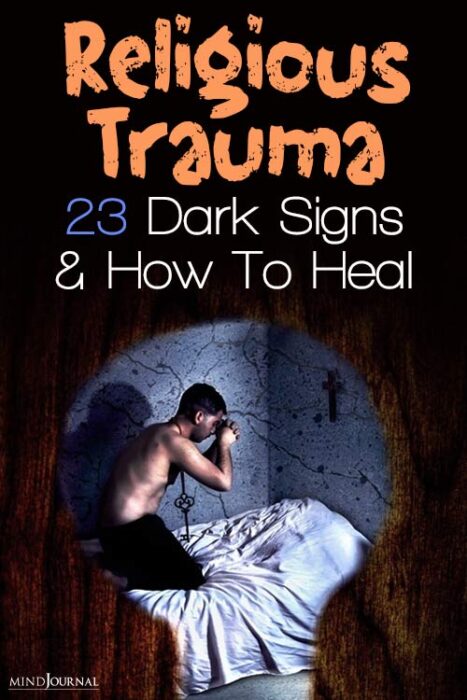
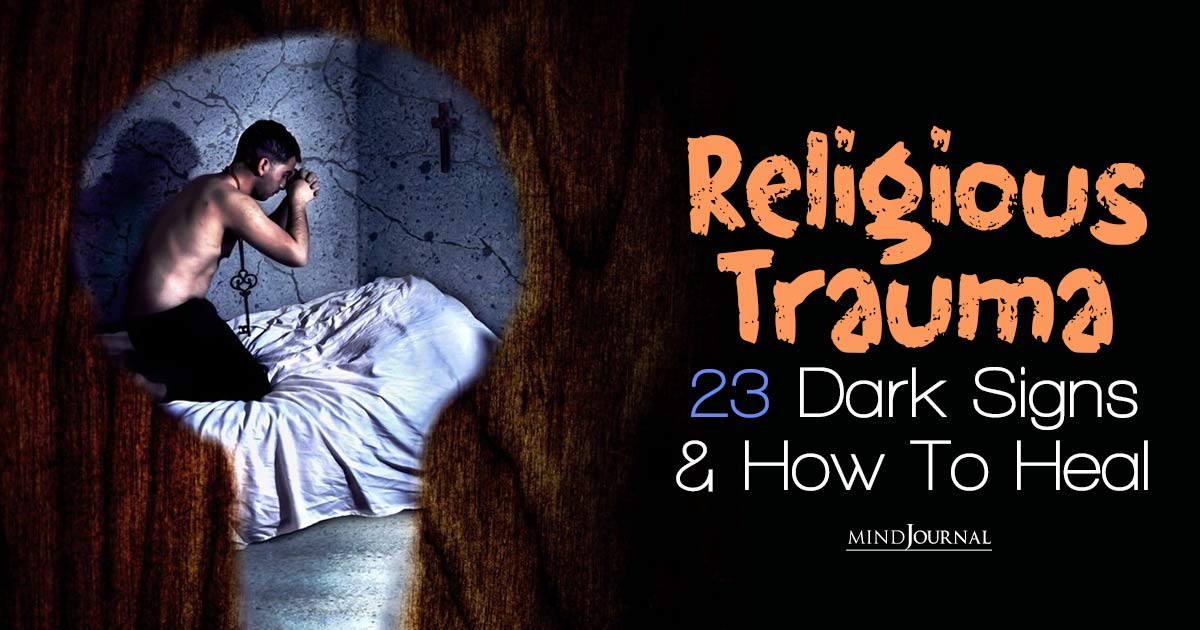





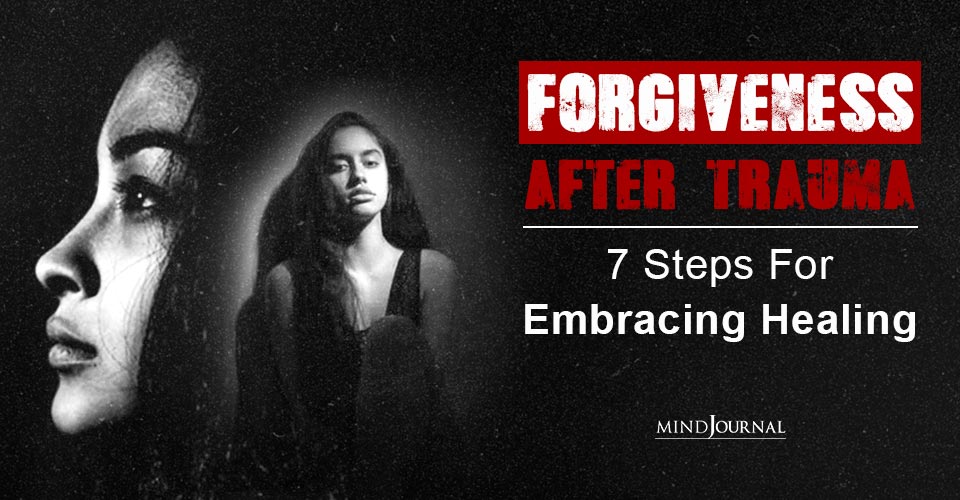

Leave a Reply
You must be logged in to post a comment.